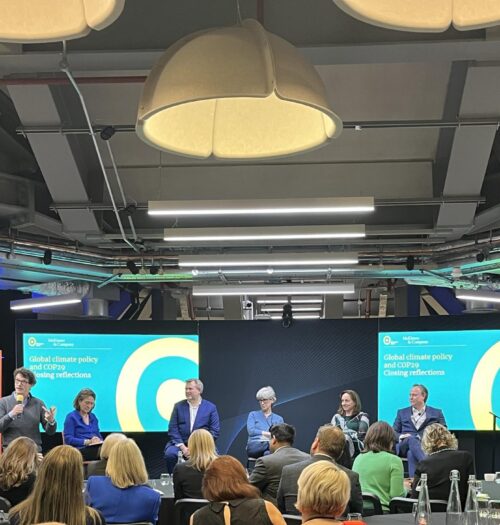
Global climate policy and COP29: implications for business
Policy signals coming out of COP29
Daniel Mikkelsen, Senior Partner, McKinsey & Company, and head of McKinsey Sustainability’s financial work opened the session with his own insights from attending this year’s COP, which took place from 11th to 22nd November in Baku, Azerbaijan.
Setting the climate context ahead of the negotiations, the pre-panel presentation outlined how global energy demand is growing by up to 18% in predominantly emerging economies, and that trends in global climate policy implementation are off-track from a 1.5°C emissions reduction scenario, and are currently measuring closer to between a 2.2°C to 3.5°C emissions outcome. At the same time, 66% of the world’s largest publicly-listed companies have set net zero targets — highlighting the potential for greater synergy between policy and business decision-making.
Spotlighting some of strategic priorities at COP29, the presentation covered the setting of a new global climate finance goal – the New Collective Quantified Goal (NCQG); progress on countries’ updated Nationally-Determined Contributions (NDCs); and increased clarity on carbon market rules in accordance with Article 6 of the Paris Agreement.
Mikkelsen offered the following insights into how boards can translate the debates and outcomes of COP29 into their boardroom discussions:
- Rethink sustainability strategy – Post-COP presents an opportunity to reflect on sustainability strategy and the scale and pace of climate transition plans. With NDC commitments beginning to be announced by national governments (including the UK), boards are able to survey how the policy landscape, coupled with technology advancements, can shape target-setting and risk management moving forwards.
- Expedite competitive technologies – Research shows that only 10% of the low-emissions technologies required by 2050 to support the net zero transition have been deployed, with focus very much needed on how to effectively scale up and industrialise technologies. Analysis carried out by McKinsey finds that 12 core technologies are expected to deliver 90% of the abatement that’s required and should be prioritised accordingly. Increasing technology readiness and maturity levels in key climate technologies is critical to enabling businesses to scale production assets and reduce the costs of transition-aligned infrastructure, which may help to create long-term strategic value.
- Unlock private capital to bridge the finance gap – While progress is being made, private capital remains a small proportion of the actual capital that is being mobilised, especially in developing countries. Multilateral financial institutions are doing more to provide capital and crowd in private sector finance, but many sustainability projects continue to need greater financial and regulatory support to become investable. Boards can be proactive in identifying where these needs exist and what forms of support may be most effective in filling existing financing gaps.
- Prepare for carbon as an investable asset – COP29’s agreement of a UN-backed carbon market framework is expected to improve investment potential in climate projects and support cross-border collaboration on emissions reduction strategies. With the proper integrity safeguards and transparency framework in place, these new rules could offer businesses confidence and clear guidelines for the international trade of carbon credits. In parallel, there have been a number of clear policy signals (again, specifically in the UK) around increased investment in carbon technologies, with estimates that the carbon dioxide removal industry could be worth up to $1.2 trillion globally by 2050.
- Harness digital technology to boost and de-risk transition delivery – The growing importance of digital technologies was reflected in the first-ever Digitalisation Day at COP29. Research shows that one half of the technologies and initiatives required to put the world on a 1.5°C emissions pathway can be enhanced through digitalisation, representing a major opportunity for boards to assess opportunities for enhancing the role of digital technologies in strategy delivery.
Enhanced business ambition on the road to COP30
After the presentation, the panel session commenced, comprising moderator - Susan Hooper, board member, Chapter Zero, and panellists: Vanessa Havard-Williams, Chair of the Transition Finance Market Review, HM Treasury; Thomas Lingard, Global Head of Sustainability, Unilever; and Fiona Howarth, CEO, Octopus Electric Vehicles.
The panel discussion began with reflections on some areas of increased ambition levels at COP29, as seen with the announcement of the UK’s updated NDC, and how this may support a more consistent enabling environment for businesses’ climate strategies. Participants commented on the importance of clear policy signals from government for business planning and how greater recognition of the private sector’s role in delivering net zero could help to direct boardroom strategies. Consistent policy and market signals were seen by panellists as particularly beneficial in terms of target-setting, including reinforcing targets such as Scope 3 emissions reductions, which are outside the direct control of individual companies. Panellists discussed how tackling emissions across the value chain can often require cooperative action between private and public entities and supportive policy and regulatory frameworks, alongside alignment on an actionable timeframe.
Building on the discussions around enabling factors, one panellist reflected on the importance of sector-level pathways to net zero. Without a stable policy environment within and across sectors, they commented that the finance needed to deliver on cross-sectoral decarbonisation is unlikely to flow at scale. Panellists agreed that the operationalisation of finance needs to be a key area of focus going forward, and that it would be beneficial for innovative forms of blended finance and industry partnership to be explored at pace. There was panel-wide agreement that progress on these important levers could lower the risks associated with many long-term sustainability projects and crowd in the capital needed to deliver them.
As part of the moderated Q&A discussion following the panel, audience members were informed of several ongoing efforts from this year’s COP that may be carried forward into COP30 next year in Brazil, including developing discussions around the role of raw material supply chains in scaling up decarbonisation and the push for a new binding global treaty on traceability for critical minerals. Nature and biodiversity, and topics such as loss and damage financing, were also flagged as likely to be higher on the agenda at COP30 in November 2025.
Key takeaways:
As the panel drew to a close, some of the key takeaways for boards from COP29 could be summarised as:
- Strategic alignment – non-executive directors can use the emerging policy signals, particularly in the UK, to support long-term strategic planning in line with their stewardship role of ensuring that organisations are properly balancing performance expectations with long-term sustainability objectives. Businesses that have set ambitious climate goals could now benefit from staying the course and maintaining strategic oversight of the mechanisms and technologies needed to transition. Aligning climate strategies to these broader policy and market signals, could enhance long-term business resilience, not only in terms of de-risking portfolios and activities, but also in driving value and attracting investment.
- Stakeholder engagement – there is a huge opportunity for businesses to communicate across their stakeholder maps about their transition priorities. Business-government dialogue may also help ensure that policy and regulation reflects business reality and is geared towards impactful, measurable progress, while also being clearer about where policy interventions are not working. How businesses engage with the policy landscape will be entirely context-dependent, but for boards it will remain crucial to understand the direction of travel for policy and build this into scenario planning and strategic decision-making.
- Global co-operation – COP reminds us that the climate crisis is a global problem that requires a global response. In the face of geopolitical unknowns, businesses can foster opportunities for collaboration and innovative forms of industry partnership, both across sectors and geographies, to support climate resilience.
This event summary was developed in collaboration with the Centre for Climate Engagement at Hughes Hall.
You can read the summary of session 1 of the series for 'Hyper-scaling climate technologies: From ideas to shareholder value’ here.
The third session on 'Unlocking sustainability success with technology' will take place on 4th March 2025, which you can register to attend here.



